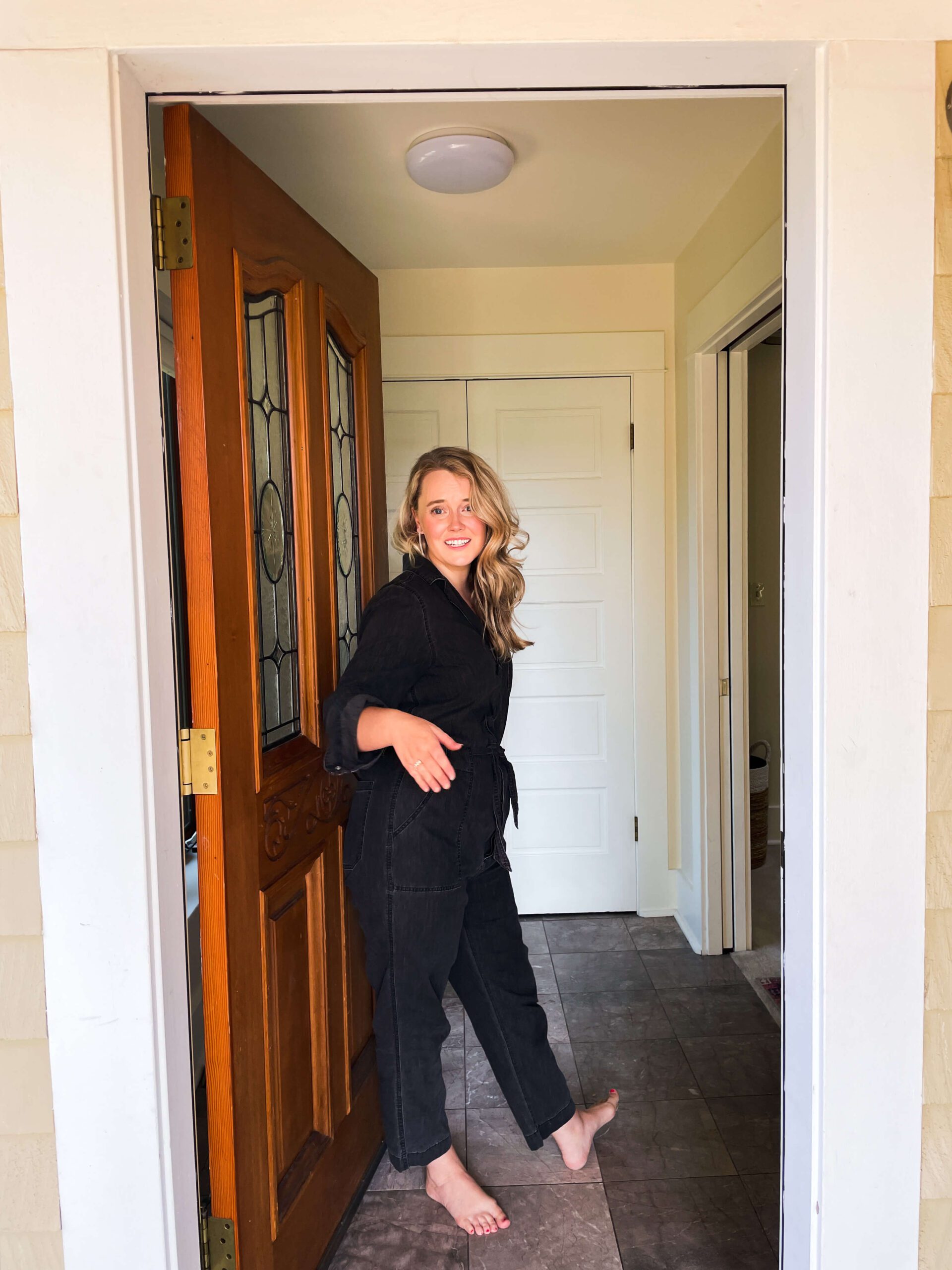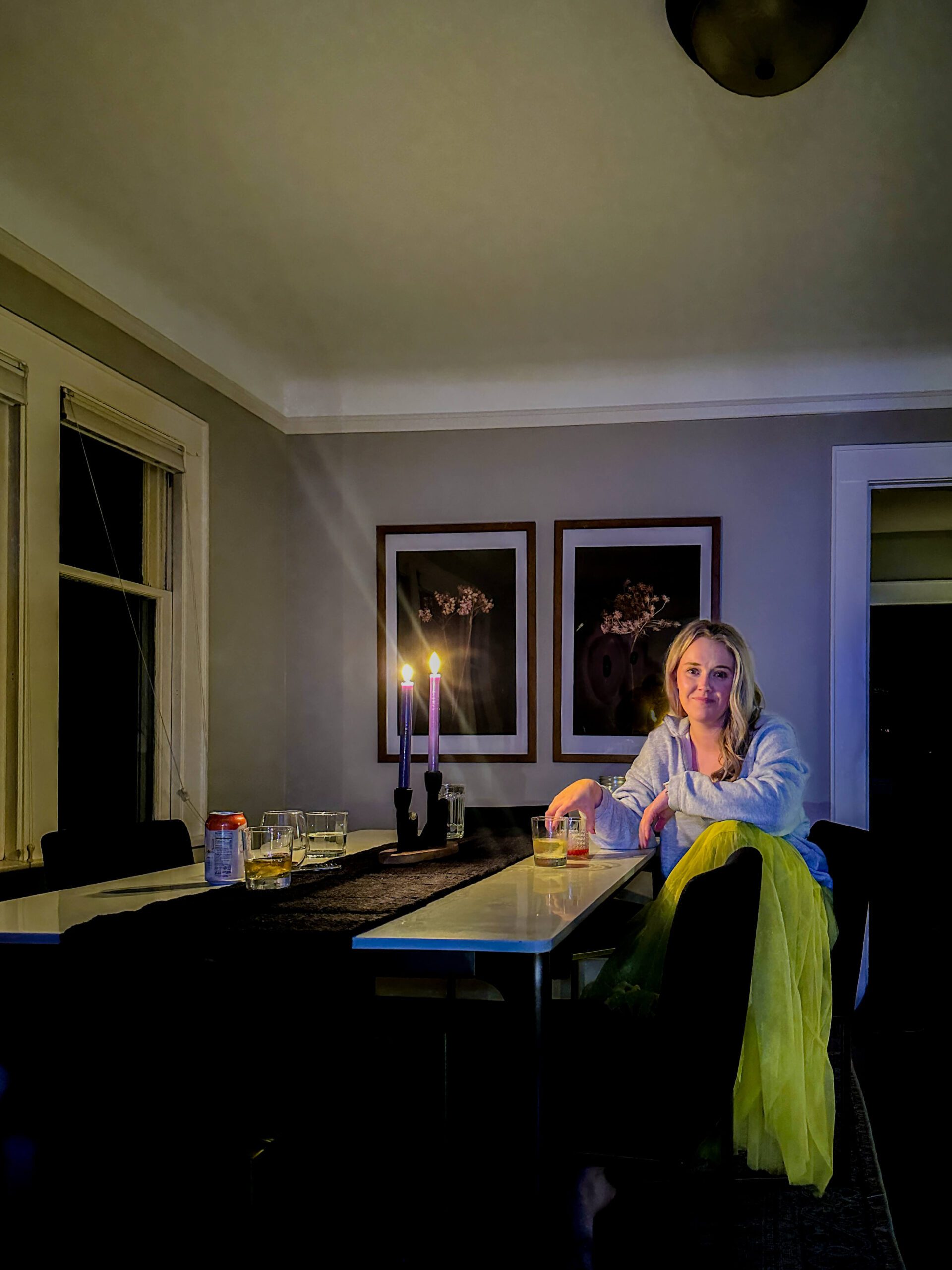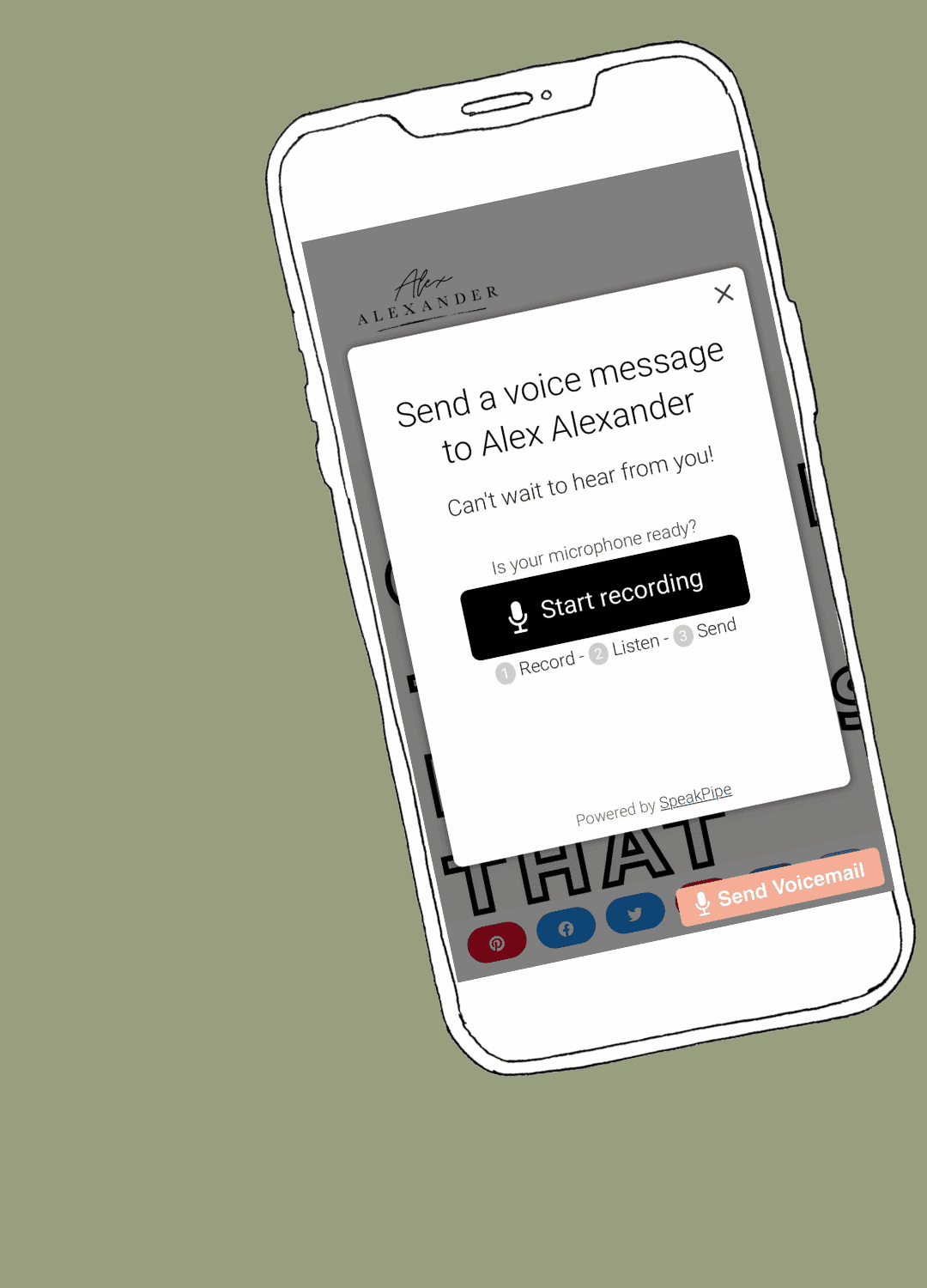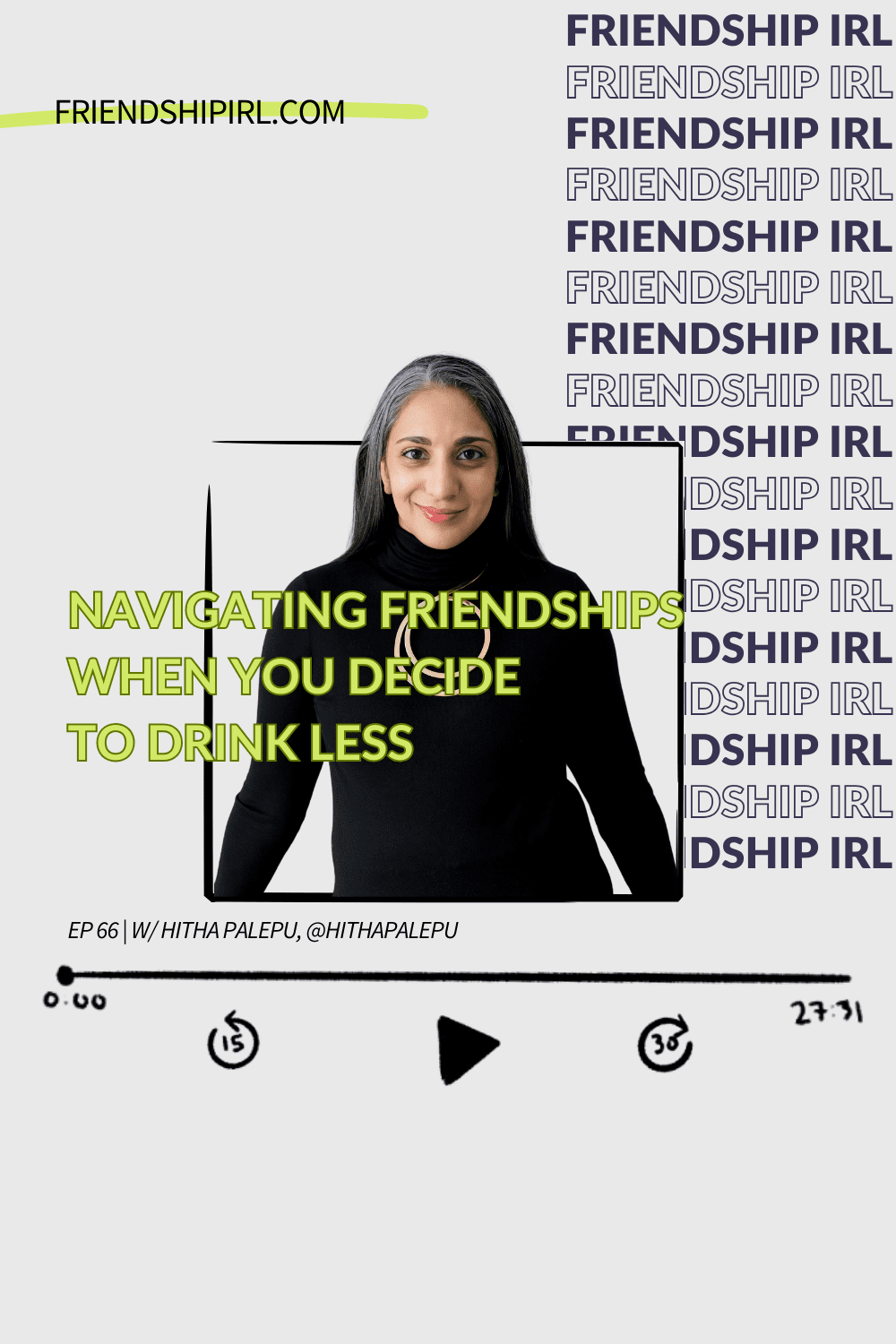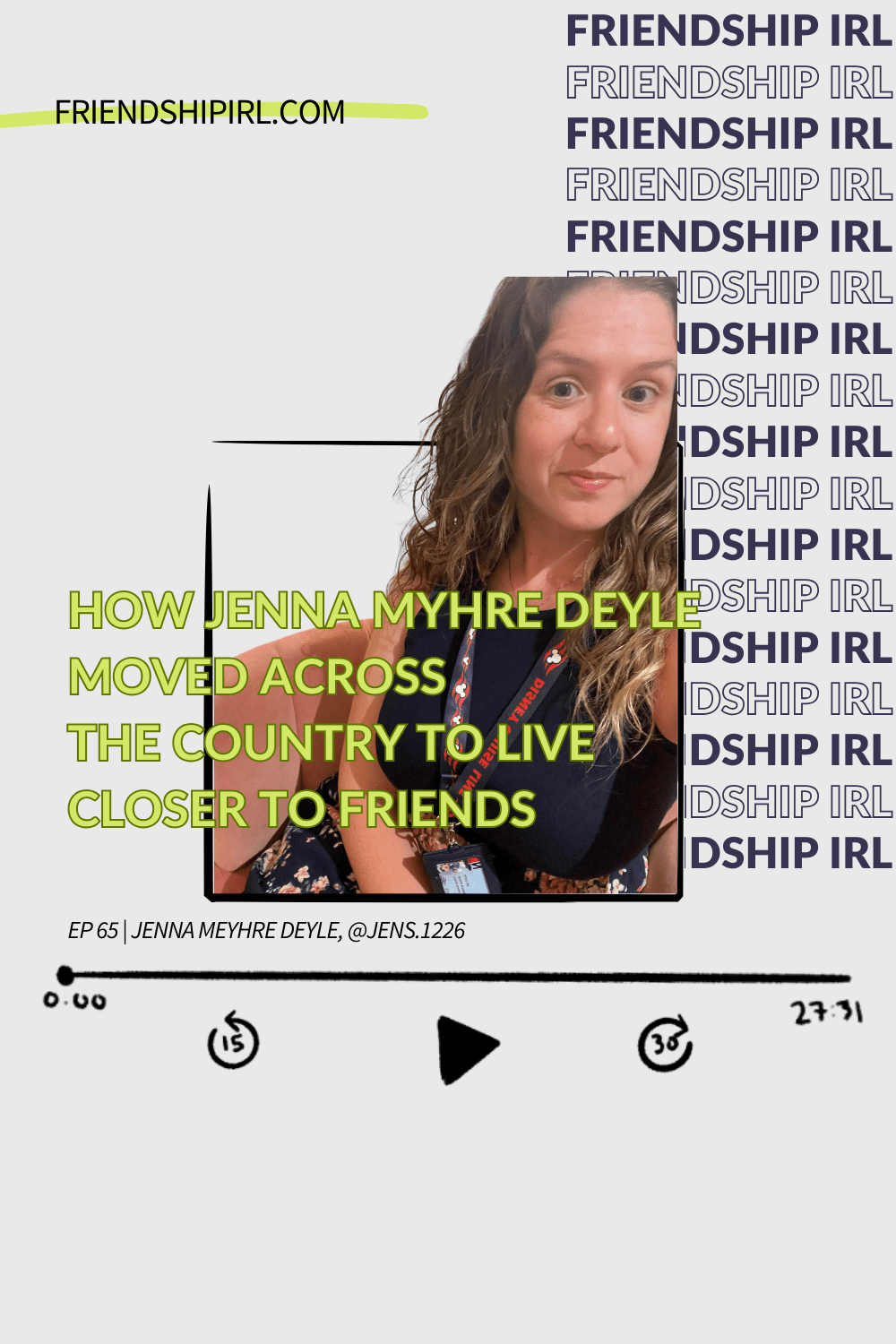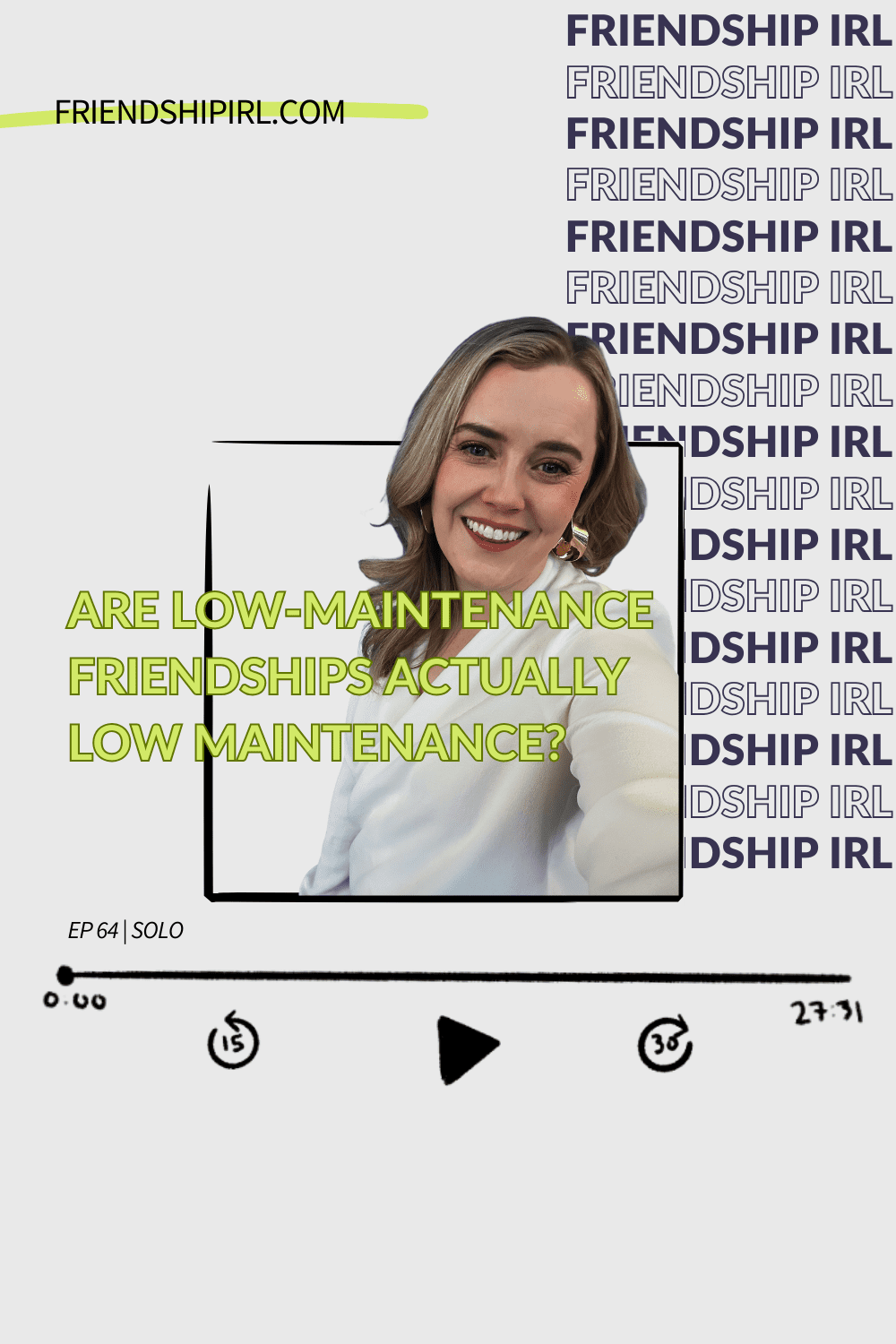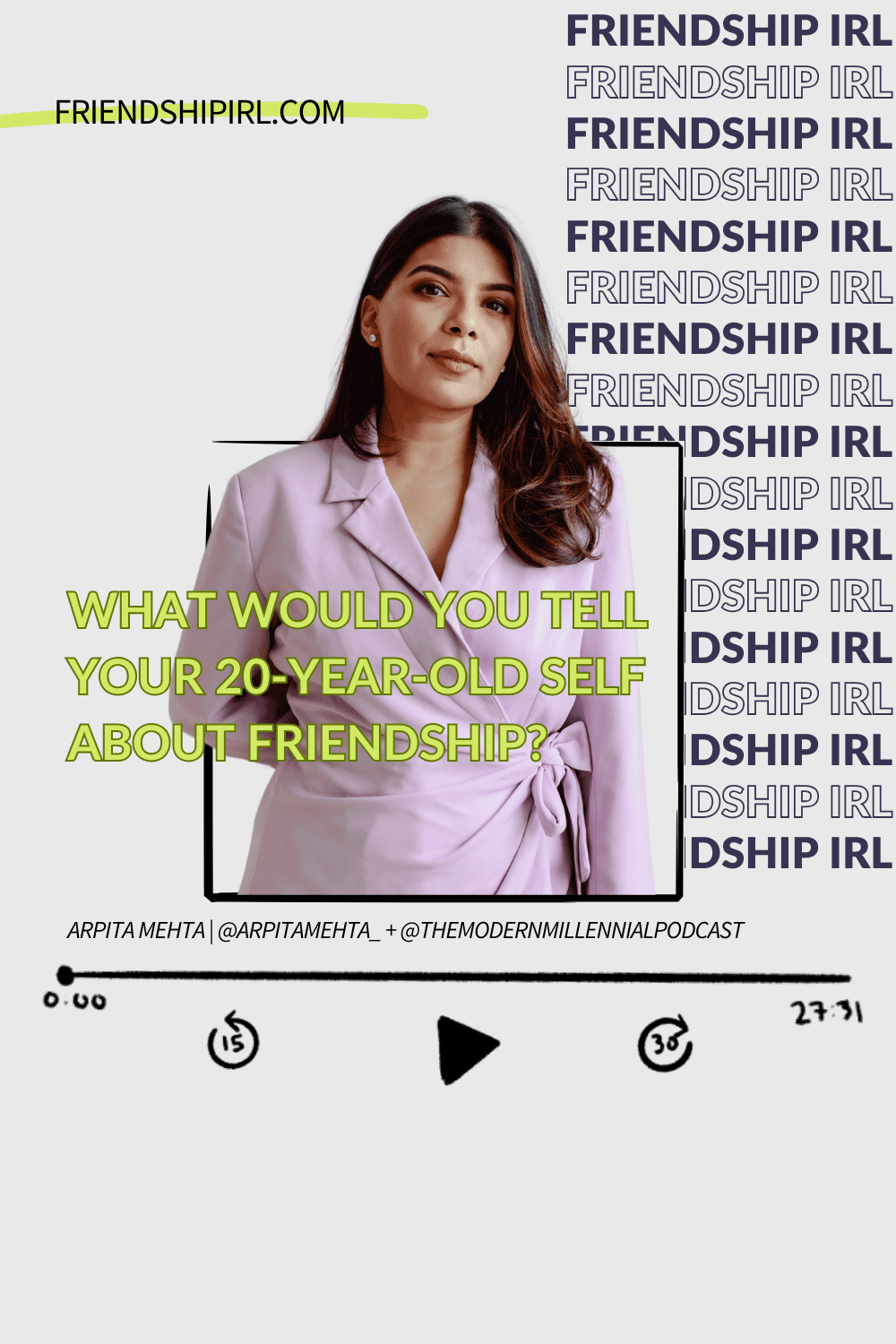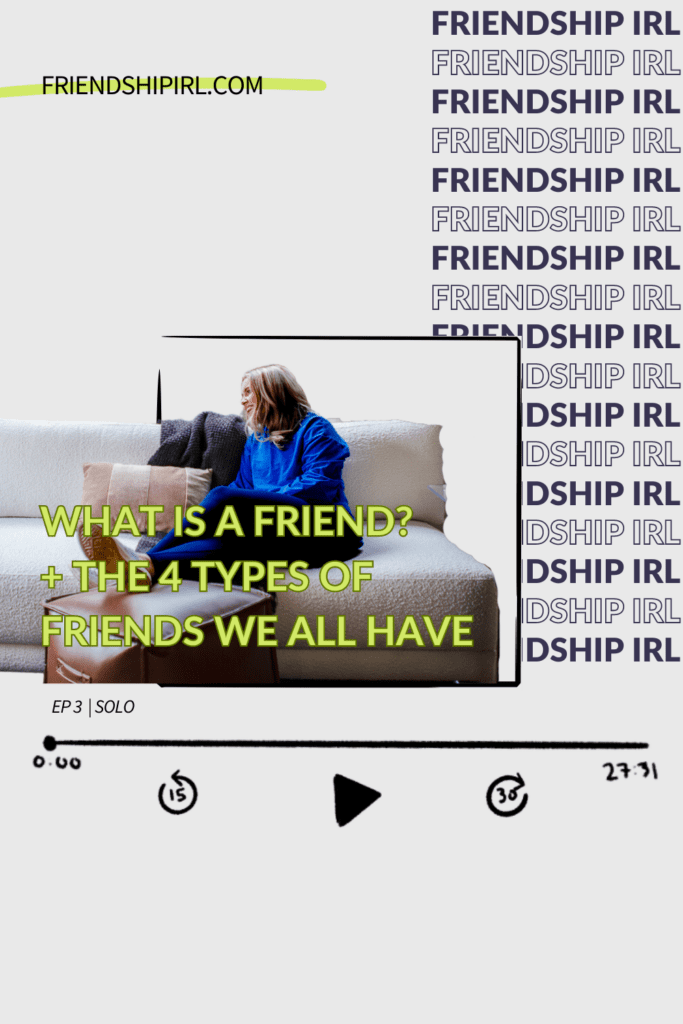
Podcast Description
This is a pretty important episode because I want to talk about this ONE question:
What is a friend, really?
A lot of people are walking through life focusing on what isn’t there when it comes to friendship. There’s somehow an arbitrary marker of “we are friends!” that I don’t even think most people can articulate. The truth is, it doesn’t have to be so black and white.
There’s so much value happening in our friendships before they hit whatever this arbitrary threshold is that we’re ignoring.
If you’ve ever thought, “I wish I was closer to that person” or “Our friendship used to feel different!”, prepare to be inspired as I share the 4 types of friends we all have in our lives, and how we can come to appreciate all of these friends in their own unique ways.
In this episode you’ll hear about:
- Why we’re holding ourselves back from experiencing true friendships
- The difference between “Familiar Friends”, “Defined Friends”, “Present Friends”, and “Historic Friends.”
- The beauty of taking small actions over time with our friends (it all adds up!)
- What emotional intimacy roots are, and why they are key to sustaining close and supportive friendships
- Moving through the peaks and changes of friendships in our life, especially when one moves away or gets a new job
- Holding on to our friendships more loosely vs. gripping on so tight
Reflection Question:
In which “bucket” do you have the most friends? Is there a small action you can take today to make a friend feel appreciated?
Notable Quotes from Alex
“I have this belief that if we untangle the ways we are connected, we will realize we are more connected than we initially thought. And that might help us to appreciate the spectrum of friendships versus waiting for some arbitrary threshold to see someone as valuable in our life.”
“Small actions add up. Sometimes I think we forget that our closest friends were at one point just people. They walked down the hall. They were another person wearing a similar sweater and we said, “Hi”, we sat next to them in class and started chatting. We learned we were both going to be on the soccer team. And back then, we saw that simple building as valuable, like there was potential. So tap back into that. Let the small things be worthwhile.”
Resources & Links
Learn more about emotional intimacy roots on my blog.
Like what you hear? Visit my website, leave me a voicemail, and follow me on Instagram!
Want to take this conversation a step further? Send this episode to a friend. Tell them you found it interesting and use what we just talked about as a conversation starter the next time you and your friend hang out!
Leave Alex a voicemail!
Related to ” What Is A Friend? “
@itsalexalexander Reply to @jayceerose17 BTW — Work friends are often defined friends. Be sure to come back for that video. #friendshipadvice ♬ original sound – Alex | Community + Friendship
@itsalexalexander Think of your “closest friends.” Memories of friends in HS and college might appear. Want to know how you got so close? YOU LIVED LIFE TOGETHER. Grocery store, laundry, cooking. FYI- You can still do that.
♬ Sweet Disposition FeelingBlew – Feelingblew
Can I add you to the group chat?
Don't miss an update - Sign up for our weekly newsletter.
Until next time…
Take the conversation beyond the new podcast on friendship! Follow Alex on Instagram (@itsalexalexander) or Tiktok (@itsalexalexander), or send her a voice message directly with all your friendship thoughts, problems, and triumphs by heading to AlexAlex.chat and hitting record.
Episode Transcript
Podcast Intro 00:02
Alrighty, gang. Here’s to nights that turn into mornings and friends that turn in family. Cheers!
Podcast Intro 00:18
Hello, Hello, and welcome to the Friendship IRL podcast. I’m your host, Alex Alexander. My friends… They would tell you; I like to ask the hard questions. You know who I am in the group? I’m the person that’s saying, “Okay, I’m going to ask this question, but don’t feel like you have to answer it.” And now, I can be that friend for you, too.
Alex Alexander 00:50
Hello, hello. I’m here for another solo episode. Now, this was not what I planned. What I planned was to try and drop something. I don’t know, a little catchy a little out there. And maybe some insight into friendship breakups or how I made a new friend on the internet. I don’t know, something a little more viral-worthy, I suppose.
Alex Alexander 01:24
But I stopped myself because I think before we dive in, this episode has to happen. This is a pretty important episode. That’s because I want to talk about this question.
Alex Alexander 01:39
What is a friend? …What is a friend?
Alex Alexander 01:43
Really? How would you define a friend?
Alex Alexander 01:48
Are there certain characteristics? Do you have so much history together? Do you spend so much time together? What makes a friend because I want to offer you a thought. I think that a lot of people are walking through life, day to day focusing on what isn’t there.
Alex Alexander 02:11
When it comes to friendship. There’s somehow an arbitrary marker of we are friends that I don’t even think most people can articulate. And yet, that’s where we’re focusing we’re focusing on what is not there. And doing that means we miss out on everything that is there.
Alex Alexander 02:38
There’s so much value happening in friendships before they hit whatever this arbitrary threshold is that we’re just ignoring.
Alex Alexander 02:49
If you are like, “Alex, I don’t know if that’s right.” Okay. Okay. Let me give you some examples.
Alex Alexander 02:56
To most people, when they’re talking, friendship is binary – either someone is your friend, or they are not your friend.
PODCAST EPISODE! How to Build Friendships Beyond Catching Up with Alex Friedman, Founder of Connection Feast. Listen here!
Alex Alexander 03:08
Very rarely do people admit the gray area. Very rarely do people say, “Well, they’re kind of my friend. No. People say, Oh, yes, they’re my friend.” “Or I don’t think they’re really my friend.” And we’ve created this yes or no.
Alex Alexander 03:24
When most people can’t even explain what turns a “no” into a “yes”.
Alex Alexander 03:28
Work friends are another great example. This happens all the time, where I’ll be talking to someone and somebody will tell me, “they don’t think they have any friends anymore.” Yes, that is a real conversation I have with people quite regularly, and some people don’t.
PODCAST EPISODE! What is a Friend? and the 4 Types of Friends We All Have. Listen here.
Alex Alexander 03:43
And if that’s you, please keep following along. And hopefully this will help you.
Alex Alexander 03:48
But what often happens is people will tell me, they don’t think they have any friends anymore. And then after a minute or two, they’ll say, “Well, I guess I have work friends. Are those friends?”
Alex Alexander 04:03
And again, they don’t know.
Alex Alexander 04:05
They don’t know what their marker is of we are friends. And they see it as a two option system. So instead of appreciating whatever is there in this work, friendship, they’re just focused on the fact that it doesn’t meet some marker they don’t even know exists.
Alex Alexander 04:22
And this is costing us. This arbitrary “we are friends” without valuing all the stuff that exists before you get there.
Alex Alexander 04:35
It’s costing us because when you don’t appreciate those small values that are adding up, it causes you to hold back.
Alex Alexander 04:46
Some examples of this.
Alex Alexander 04:48
If you don’t see this simpler, new friendship as providing some value. You probably aren’t going to want to invest a lot of time in it.
Alex Alexander 04:58
You’re going to hold back In moments where you could show up for somebody, so if something happened, if they got in a car accident, lost a loved one, brought a new baby home good and bad, you might find yourself saying, Oh, well, I don’t know them well enough to lend a hand.
Alex Alexander 05:16
So we’re holding back opportunities versus saying, “You know, I really appreciate that I see them in my neighborhood all the time. That is valuable. And I can show up for them in a small way.”
Alex Alexander 05:32
In this moment, if we noticed and appreciated what is there, we’d probably be more likely to act.
Alex Alexander 05:41
And those small actions would add up whether they ever progressed to a closer friendship or not, it could just mean that this simpler friendship provides value. In simple ways in our everyday life.
Alex Alexander 05:57
It could mean that this neighbor is the person you can now call when you’re out of town and you realize you need somebody to take your trash can out. That’s valuable.
Alex Alexander 06:08
Haven’t we all been there, like a package arrives? “Oh, shoot, how am I going to get that inside, I’m still gone all weekend.”
Alex Alexander 06:17
The other way that this is costing us is we are overwhelmed needing to get to this arbitrary marker of friendship — whatever that is to you. And it’s going to be different for everyone.
Alex Alexander 06:31
By the way, my definition, my markers are going to be different than yours. And mine are also probably different within different relationships.
Alex Alexander 06:41
But if we hold out to this marker, whatever it is, especially if we don’t know what it is, we get overwhelmed by all the work it takes to get someone to our “definition of a friend.”
Alex Alexander 06:56
Like that’s a lot. If you think about your closest friends, you probably feel like you are connected in a lot of ways.
Alex Alexander 07:01
That is a lot of time and energy do you want to invest that you don’t know how this friendship is going to turn out. You might be friends with them for a year and it never really goes anywhere. And then you feel like you’ve wasted your time. Because it didn’t get to that marker of friends because it didn’t continue versus just appreciating the value abroad.
PODCAST EPISODE! Staying Curious and Managing Differences in our Friendships. Listen here.
Alex Alexander 07:26
When you appreciate the small values, that friendship bring, the time investment is a lot less overwhelming. You’re seeing small value, you can show up in small ways. And over time, those will add up to bring meaning in some way, shape or form.
Alex Alexander 07:43
You know, there’s a lot of things out there that bother me about the way we talk about friendship and books and articles and things like that.
Alex Alexander 07:52
One of them is this stupid stat about how many hours it takes to make a friend. I don’t remember how many hours it is 200 or something. That’s a lot of time to look at and think, “Oh, am I actually able to do that? Where am I fitting that in?”
Alex Alexander 08:12
So I wonder how much time does a friendship – if we are valuing these simpler friendships – really need? Because I’d venture to say it’s probably a lot less than we’re telling ourselves.
Alex Alexander 08:26
If we just committed to small actions and allowed them to add up and we didn’t need to hit this marker that we don’t even understand. We would just start doing it. And we would let it be what it is. And we would create value over time, instead of ticking off every hour till we hit that 200 our and then trying to decide if we met the marker of friendship.
Alex Alexander 08:53
So the other reason this is costing us because it’s warping our sense of time. I don’t know a better way to put this, so I will talk it through.
Alex Alexander 09:03
Okay, so our closest friends, we love them because at one point in life, whether that is now or previously, we spent a lot of our time together.
Alex Alexander 09:16
We did things. Right?
Alex Alexander 09:17
College friends. You went to the grocery store. You walked to class. You laid around on the couch. You drove each other to doctor’s appointments.
Alex Alexander 09:29
And over time, you collected memories and ways that you showed up for each other. We value that.
Alex Alexander 09:38
So I don’t know where we shift, but at a certain point, we start to value the history – the amount of time we have known someone and collected all the- I call them emotional intimacy roots (You can find them on my website and in the show notes) and we value vulnerability
Alex Alexander 09:56
But that takes time to open up to someone. It doesn’t seem like we really value the present time as much at a certain point in life. I think as adults, that loses its luster.
Alex Alexander 10:13
And because we want to jump to the history and the vulnerability, we’re not present as much in the moments, we’re just trying to fast forward.
Alex Alexander 10:25
You know, a work friend is a great example of this. Work friends – you might be spending 40-plus hours a week with this person. You are experiencing a part of your life together. It’s very likely your close friends, family romantic partner, don’t really know that much about (your work life). They are not a part of your work day. They don’t know what the company culture is. Sure, you can tell them when you get home, but they are not ‘in it’ the way a work friend is. So we are investing that time in the present with them (your work friend).
Alex Alexander 10:56
But because we don’t have a ton of history or vulnerability, somehow, we don’t see it as valuable.
Alex Alexander 11:04
People are asking me, “Is a work friend is a real friend?”
Alex Alexander 11:07
I believe that if we untangle the ways we’re connected, and this is through my roots – there are three ways. And I’m not going to lay them all out on this podcast, but you can go read about them.
Alex Alexander 11:22
But if we untangle the ways we are connected, we will realize we are more connected than we initially thought. And that might help us to appreciate the spectrum of friendships versus waiting for some arbitrary threshold to see someone as valuable in our life.
READ MORE: Want to learn more about how we are connected with friends? Read about my Roots Framework.
Alex Alexander 11:43
Now I want to walk through another concept I have, which we’re working on a name for. I think the current working title is like the “Your People” framework.
Alex Alexander 11:54
And this includes everything from your family, to your formal communities, to your acquaintances, your friendships, your past friendships and relationships.
Alex Alexander 12:05
And today, I just want to talk about friendships.
Alex Alexander 12:08
So the simplest, is what I call a familiar friend. This isn’t an acquaintance – an acquaintances is also on my chart, but I’m going to skip acquaintance.
Alex Alexander 12:18
A familiar friend is somebody that you see in the places you’re out living life. So maybe a friend of a friend, you see them at your friend’s parties, at their barbecues. This could be somebody you see at the gym, you’re not very close to them, but you would recognize them and walk in at your kids school. When you go to the Christmas concert. And you walk in, and you’re looking for someone to talk to and you think to yourself, “Oh, I could go talk to them. It’s been a while”
Alex Alexander 12:52
You know, some familiar details, but you wouldn’t really contact them for any reason, you’re not initiating a lot of contact. And most people would just be like, “Oh, well, they’re not my friends.” But when you walk into a space where you would otherwise know no one.
Alex Alexander 13:08
These people will provide familiarity and belonging and connection.
Alex Alexander 13:12
These people are also people that could become potential closer friends. And yet, most people just think, “Oh, they’re not my friends.”
Alex Alexander 13:23
But I’d like to challenge you to say, “they’re, you’re familiar friends.” They are people that provide familiarity in places where you would otherwise be alone.
Alex Alexander 13:32
The next are defined friendships.
Alex Alexander 13:35
So these are people that you are friends with, you might have pretty high vulnerability, you might spend a lot of time with them. So you might feel really close to them. But I call them defined because you only see them in one context.
Alex Alexander 13:52
So your work friends, you don’t really hang out outside of work. You see them at work, though. They know the names of your siblings, they know your parents are coming into town. They know about your job you tell him about the trip you recently went on. You share things with them, you spend a lot of time with them.
Alex Alexander 14:12
They support you in career discussions, that is all valuable, even if they are not your closest friend.
Alex Alexander 14:21
The next kind are present friends, and I think these are the ones that everybody wants.
Alex Alexander 14:25
These are the ones that we are doing life with. I think for most people, these feel like the “peak” friendships.
Alex Alexander 14:37
You spend a lot of time together. You talk about a lot of topics, you support each other. You share history, you connect in a variety of ways in your life. They might be a work friend, but they also are the friends that come over for a Sunday barbecue or you invite to a family function.
Alex Alexander 14:57
Now the thing is no one expects an athlete to sustain their peak.
Alex Alexander 15:05
And I think that’s sometimes what we expect out of these present friendships, we want them to sustain their peak, we want them to feel this good all the time.
Alex Alexander 15:17
And with life’s changes, that’s very unlikely people are going to move, change jobs, have kids and shift the way that you spend time together, find a romantic partner.
Alex Alexander 15:29
And suddenly, you’re not laying on the couch together every day. I mean, you could, but most people don’t. (I’d recommend it.)
Alex Alexander 15:36
It is unfair to expect these friendships to maintain their peak. And these are the ones where they’ve hit the threshold.
Alex Alexander 15:42
I would say – I think most people feel like this is the threshold. But if it changes, then we’re frustrated, instead of just appreciating that it’s different and still seeing the value but that it provides.
Alex Alexander 15:56
The final kind of friendship is historic friendships.
Alex Alexander 16:00
Now, these are the ones that were probably present friendships, that could be defined to, but they’re probably present friendships and something changed the ways you’re connecting change.
Alex Alexander 16:11
So this could be your friend who lives nearby, you spent all sorts of time together, and then they got a new job and moved across the country.
Alex Alexander 16:20
That’s changing the peak. This is what I was talking about.
Alex Alexander 16:23
It is hard to sustain the peak.
Alex Alexander 16:25
Things feel different now.
Alex Alexander 16:27
They can’t just drop by your house after work. They can’t make every Sunday barbecue.
Alex Alexander 16:33
And we have to grieve that they’re different. But they’re still valuable. These people still hold a ton of our history and memories and know us at a certain age, they still might be the people we call when we need support.
Alex Alexander 16:48
And different isn’t bad different is just different.
Alex Alexander 16:53
And there’s going to be a different peak in a historic friendship.
Alex Alexander 16:58
And these simpler friendships might be a way to fill in the gaps.
Alex Alexander 17:03
So if your present friend moved across the country and one of the ways we spent time together with paddleboarding, you could find a friend who’s maybe like a defined friend, a friend that you go paddleboarding with, and they may not be your closest friend, and allow them to fill in that gap for you.
Alex Alexander 17:20
Even though they aren’t your closest friend, they are providing value you are providing value to them. You are spending time together, enjoying an interest.
Alex Alexander 17:31
So as you can see, if we’re looking at what is there instead of what isn’t there, we’re moving through our days, more likely to show up in small ways.
Alex Alexander 17:44
We’re less overwhelmed.
Alex Alexander 17:47
And we’re getting to the end of our days. And instead of having interactions and getting home and feeling that vulnerability of “I wish I was closer to that person. Our friendship used to feel different. It used to feel better.”
Alex Alexander 18:01
What have you spent 90 seconds appreciating what was great about the interactions you’ve had?
Alex Alexander 18:08
Because if you did that, you’d be a lot more likely to send them a text, follow up, get together, find new ways to connect.
Alex Alexander 18:16
Now I want to close with this.
Alex Alexander 18:18
I have talked a lot about finding the value you are receiving.
Alex Alexander 18:24
But how does it feel that you could just show up for someone in your ways?
Alex Alexander 18:32
What I mean by that is — instead of starting a friendship and feeling like you have to show up in all the ways for that person. You have to be all the things. You have to try to get super vulnerable and get super close.
Alex Alexander 18:46
If we held on more loosely, instead of tightly gripping these friendships, and we just got to show up in the ways we can.
Alex Alexander 18:56
And that was valuable, our contribution was valuable.
Alex Alexander 19:00
Doesn’t that feel a lot more doable? More sustainable?
Alex Alexander 19:05
You can just offer what you can and let that be enough.
Alex Alexander 19:09
And then you can allow others to do the same for you.
Alex Alexander 19:13
And then we’ll all cumulatively stack up amongst the moments of life and allow you to build the support system you need.
Alex Alexander 19:22
That’s a lot less pressure, I think.
Alex Alexander 19:24
So I try and see my own offerings as valuable — not what they could have been at their peak at their threshold.
Alex Alexander 19:35
Maybe I wasn’t there today. It’s hard to sustain. But instead what I did offer was valuable. And if I continue to show up in small ways that will create what I want and what you want and what the other person wants.
Alex Alexander 19:52
Small actions add up.
Alex Alexander 19:54
Sometimes I think we forget that our closest friends were at one point just people
Alex Alexander 20:00
They walked down the hall. They were another person wearing a similar sweater and we said, “Hi.” We sat next to them in class and started chatting we learned we were both going to be on the soccer team. And back then, we saw that simple building as valuable, like there was potential.
READ MORE about making friends here – Roots 101
Alex Alexander 20:20
So tap back into that. Let the small things be worthwhile. And don’t feel like you have to “be it all” or they have to “be it all.”
Alex Alexander 20:31
Maybe we can all move on with our day and just think about “WHAT IS A FRIEND?”
Alex Alexander 20:36
What actions are stacking up that are valuable in your life that make someone a friend.
Alex Alexander 20:45
With that, friends, I’m gonna leave you today.
Alex Alexander 20:49
But don’t worry. I’ll see you next week. Thank you for listening to this episode of Friendship IRL. I am so honored to have these conversations with you. But don’t let the chat die here. Send me a voice message. I created a special website just to chat with you.
Alex Alexander 21:07
You can find it at alexalex.chat.
Alex Alexander 21:12
You can also find me on Instagram my handle is @itsAlexAlexander.
Alex Alexander 21:19
Or go ahead and leave a review wherever you prefer to listen to podcasts!
Alex Alexander 21:24
Now if you want to take this conversation a step further. Send this episode to a friend. Tell them you found it interesting. And use what we just talked about as a conversation starter the next time you and your friend hang out.
Alex Alexander 21:38
No need for a teary goodbye. I’ll be back with a new episode next week!

